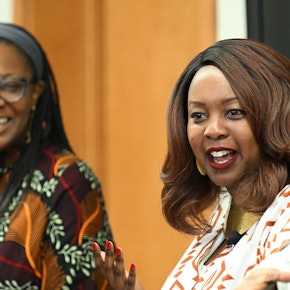Explore
Search results

Race, ethnicity, age, sex, environment, and other social determinants of health can all impact how different people respond to the same medicine or vaccine. This is why diversity and inclusivity at every stage of the medical research process are critical to learning about the safety and efficacy of potential treatments for all patients. Presented by Pfizer.


An entire generation of children in some of the world’s poorest countries are now protected against deadly infectious diseases, thanks largely to Gavi: The Vaccine Alliance. Impact: more than 16 million lives saved, vast healthcare cost savings, and greater global health security. A leading force behind the push for equitable access to COVID-19 vaccines, Gavi has played a...

Hospitals and health systems have a critical role to play in turning health equity talk into action. Learn how the field is using strategic investments to drive innovative solutions forward. Presented by the American Hospital Association.

Private equity firms are using leveraged buyouts, venture capital, and other funding sources to acquire hospitals, clinical practices, nursing homes, and other health-related businesses on a grand scale. In 2021, they poured more than $200 billion into the sector, compared to $41 billion in 2010. Investors claim their capital will expand access to care, drive innovation, f...

Achieving vaccine equity requires authentically communicating with and listening to all communities. As healthcare leaders, we must go where the community is to hear their stories, comprehend their challenges and better understand how to overcome their hurdles. Presented by Novavax.

In its landmark 2002 study, Unequal Treatment, the Institute of Medicine (IOM) stated bluntly that racial and ethnic minorities receive lower-quality health services than white Americans. Two decades after the IOM called out structural racism, the devastating toll remains apparent in the uneven risks associated with COVID, diabetes, asthma, cancer, stroke, and pregnancy. P...

In the wake of transformative biopharmaceutical innovation and breakthroughs, Americans need a health care system that ensures these life-saving breakthroughs reach all patients. Courtney Christian reflects on three tangible, collaborative ways to improve health equity. Presented by PhRMA.

As the second largest minority group in the country, Latinos represent 19% of the population and play a significant economic, social, and cultural role. They also face disproportionate health challenges, including high rates of diabetes, obesity, hypertension, and cardiovascular disease. The absence of adequate health insurance, lack of timely access to care, language barr...

Inequitable and untimely responses to COVID-19 and other pandemics. Disproportionate health impacts of climate change in Africa. Unequal financing mechanisms. Lack of reliable data and information. A dearth of leadership guided by human-centered values. These are a few of the many challenges that stand in the way of global health and development systems that work for all....

The COVID-19 pandemic forced the world to grapple with a long-standing truth: that poor diversity in early and late stage medical research remains a major threat to health equity. Overcoming barriers and challenges to fair representation in research and development will not happen overnight, nor can it be achieved by a single institution. In order to pioneer lasting and su...

Meet Nathan Chomilo, a 2023 Aspen Ideas: Health Fellow who’s incorporating community collaboration and racial equity into Minnesota’s Medicaid policy development.

The brain isn’t some static entity, cast in resin at adulthood and slowly breaking down as we age. Recent scientific research reveals that it’s an extremely adaptable and plastic organ that can become stronger or weaker — or simply different — according to the stimulus it receives. Are you ready for a neurological tune-up?

America’s robust biomedical ecosystem and the therapeutic advances it has introduced are making remarkable progress against cancer, heart disease, stroke, and other serious illnesses. But much more needs to be done to ensure that all communities can access the treatments and care they need. Prohibitive costs, ingrained biases, healthcare deserts, and distrust in the medica...

Worldwide, 10 cities have named Chief Heat Officers to address the growing threat of extreme heat. Marta Segura is leading the way in Los Angeles by connecting equity, health, and climate data to save lives and build more resilient communities. Learn how the city is making progress in the face of rising temperatures.

Since 2014, Aspen Ideas: Health has welcomed over 700 inspiring women leaders to our stages to share their bold approaches to better health. In honor of Women's History Month, we're taking a look back at some of the many highlights. From medical researchers and clinicians to entrepreneurs and activists, meet 12 change makers who are breaking barriers to reimagine a healthi...

Untapped market opportunities, coupled with the recognition that many diseases exclusively affect women, or affect them differently than men, are drawing venture capitalists into women’s health. These private equity investors, often entrepreneurial women, are motivated by a commitment to gender equity, a supportive regulatory environment, and awareness that there are profi...

Through Medicare, Medicaid, the Children’s Insurance Program, and the Center for Consumer Information and Insurance Oversight, the Centers for Medicare and Medicaid Services (CMS) provides or oversees health coverage for more than 150 million people across the country. With $1.5 trillion in annual healthcare spending, CMS plays a key role in shaping the direction of the US...

Building on lessons learned from the COVID-19 pandemic, there are significant opportunities to expand the use of rapid testing to address many health challenges around the world- from infectious diseases like malaria and HIV to non-infectious health needs like prenatal care. Learn how Abbott is intentionally approaching product development to democratize, decentralize and...

The pathway to health sometimes travels through a physician’s office, but economic stability, the physical environment, access to nutritional foods, adequate schools, and social support may be even more important way stations. These and other social determinants of health need to be considered in an integrated fashion, engaging collaborators across disciplines who have not...

